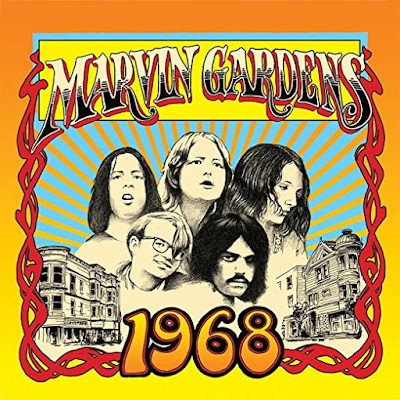Marvin Gardens – ‘1968’ (2016) review
Marvin Gardens – 1968 (High Moon CD/2xLP)
I’m sure I’ve said this before but it’s something worth repeating … don’t you just love it when you’ve been hit by a new, never heard before, or sometimes never even heard of group who were in operation during the glorious 1964-70 heyday and, after having had a good listen through what they’ve left behind, you get to thinking, wow, they’re really quite something. Of course we’ve been very fortunate with quite a few of these golden-style musical excavations that’ve come to our attention through dilligent conduits over the last few years or so.
So, yeah Marvin Gardens … who were they? Where did they come from? What turned them on? Well, like the incomparable, and at times, utterly unbelievable sounds of Uther Pendragon; of whom some of you hopefully had the immense pleasure to digest and experience on LP or CD from the Guerssen (interview/review) stable during 2015-16, Marvin Gardens were also based in San Francisco, and played a part in the whole happening gig circuit there and – even more fortunately for us – made it as far as recording some recording studio demos in an audition session for Warner Brothers. Mystifyingly, the label passed on them! Later, they would also cut a live set, and this too forms a significant part of this here astonishing, and definitive historical 1968 collection. Ugly Things magazine’s esteemed editor Mike Stax has done a thoroughly splendid job in teasing out the group’s history as well as their personalities, much of it from the horses’ mouths too, printed up within the accompanying booklet which also houses cool reproductions of some original posters and flyers plus a selection of rare period photographs.
The sound of Marvin Gardens takes in many aspects, different strands and strains from multiple genres. There’s early American music hall, hallelujah gospel, one or two slivers of beat group action and of course the upsurge of blues and folk-rock based sounds that were par for the course for most US groups that would appear across the latter half of the 1960s. Some influences from what was then a highly-stylised cornucopia of sounds placed under the psychedelic umbrella can also be firmly detected here and there. However, in their quest to be counted, and to be heard, Marvin Gardens certainly aimed to put their own original spin on things. Imagine a more psychedelicised We Five jamming out with the Charlatans, Big Brother and the Fish and this will at least give some indication as to where the group were at in the sound department. In common with her more famous peer Janis Joplin, lead vocalist/guitarist Carol Duke also originally hailed from Texas (in Duke’s case Lubbock, the town famous for spawning Buddy Holly). Duke’s versatile vocal style exuded a similar swaggering sass, confidence and conviction that compares favourably with SFs other hollering heroine, the Great Society’s and Jefferson Airplane’s firebrand femme Grace Slick. Duke brought with her to the Marvin Gardens rehearsal pad lots of different and unusual song material, some of which had been in her family for many years, so out went the fledgling group’s “top forty” approximations and in came the likes of Hoagy Carmichael, Leadbelly, Odetta and others. And alongside guitarist Fred Waxler, organist Tim Hazen, bassist Michael Lindner and drummer Dave Ray Costuros the group would spend many hours rehearsing up these new songs, fashioning and honing them further in clubs such as the Purple Onion, the Lion’s Share and the Matrix, creating what can now be honestly regarded as a real lasting artefact; one that, after careful evaluation, must surely also be remembered as being among the finest late 60s sounds the city had to offer.
1968 kicks off with “Walkin’ Down The Line” said to be a Bob Dylan original… and we hear first a tremendously sturdy demo version, a terrifically urgent affair that builds and builds with an infectiously driving rhythm, groovily piercing organ fills and one of these solid, uncomplicated lyrics from the school of blues. This opener sees the five-piece group straddling the fences of folk-blues-beat and rock all at the same time. Equally fine is their gliding rendition of the Eric Andersen favourite “Close The Door Lightly When You Go” offering up more in the way of gentle folk-rock exuberance with its nicely jangling guitars and vocal harmonies, all the while creating a tastefully melodic aura all around them. The initial version of Leadbelly’s storming “Titanic” has them setting off on a real speeding hootenanny – kazoos, it’s all happening! The self-composed “Whips and Leathers” – another of the album’s triumphant executions, was often played out at a club gig whose clientele included a gang of gay bikers who were enamoured of the group. Built around an excellent, tightly-packed arrangement, the group stirs up some daring sound action that leads into a killer Animals-esque type riff. After a while they drop into a more moody, expansive section before we’re off again with that riff and back into another verse and chorus. The whole thing possesses a decidedly more visceral feel in a murky, garage-band atmosphere that adds another layer to the already wide palette of sounds on display. This was one of the songs, alongside the afore-mentioned “Titanic” and a less propulsive take on Dylan’s “Down The Line”, that was a feature of their very rare, self-financed 7” EP (100 only pressed). Organist Tim Hazen slots in a fabulously cheeky wee nod to ? & the Mysterians’ deathless hit “96 Tears” at the start of what is an invigorating romp through “97 Men”, yet another doozie from the prolific songbook of Buffy Saint-Marie.
As mentioned earlier too, a slew of tracks were also, later, cut live, at the famed Matrix club. Those tracks feature some truly inspirational moments, not least of which, the biblically-themed “Ananias”, and another from the pen of prolific folk-singing legend Buffy Saint-Marie, have us witnessing a heavier sounding direction which the group could surely have had some success with had they managed to secure a deal and follow up on it. In the hands of Marvin Gardens, the performance of “Ananias” gives off a heady, slow-burning psychedelic-style glow; more so than anything else in the group’s canon and must’ve been a real thrill to have experienced on the night.
The more you listen to 1968 the more you realise that Marvin Gardens had something truly special to share, yet how sad to think that the group were to remain a name which slipped so far under the radar so as to be almost entirely invisible to even the most ardent fan of sixties rock for decades. Not any longer, however, and rightfully and thankfully so, therefore high praise indeed must be given to High Moon for their excavation and illumination of this not inconsiderable legacy from a rather extraordinary group.
– Lenny Helsing
© Copyright http://www.psychedelicbabymag.com/2017
Array






A good band and an enjoyable album.
I am Carol's sister. I don't know where you got your bio information
But Carol was born and raised in Bakersfield, CA also home of Merle Haggard.
Vicki Pratt